Nitrile gloves are a type of disposable glove made from synthetic rubber. Unlike latex gloves, which are made from natural rubber, nitrile gloves are hypoallergenic, meaning they are less likely to cause allergic reactions. This quality makes them a preferred choice in both the medical field and various industries where latex allergies are a concern.
These gloves are known for their high level of puncture resistance, making them more durable compared to latex or vinyl gloves. This feature is crucial in environments where exposure to sharp objects and hazardous materials is common, such as in laboratories, automotive industries, and in the handling of chemicals.
Understanding Nitrile Glove
What are Nitrile Gloves?

Nitrile gloves are protective gloves made from nitrile rubber, a synthetic copolymer of acrylonitrile and butadiene. This material is known for its resistance to oils, fuels, and other chemicals, making it a suitable alternative to latex, especially for individuals with latex allergies. Nitrile gloves are distinct for their durability and resistance to punctures and tears. They are commonly used in medical, laboratory, automotive, and food handling applications. The gloves are available in various thicknesses, offering different levels of protection, and can be powdered or powder-free, depending on the intended use.
The Manufacturing Process of Nitrile Gloves
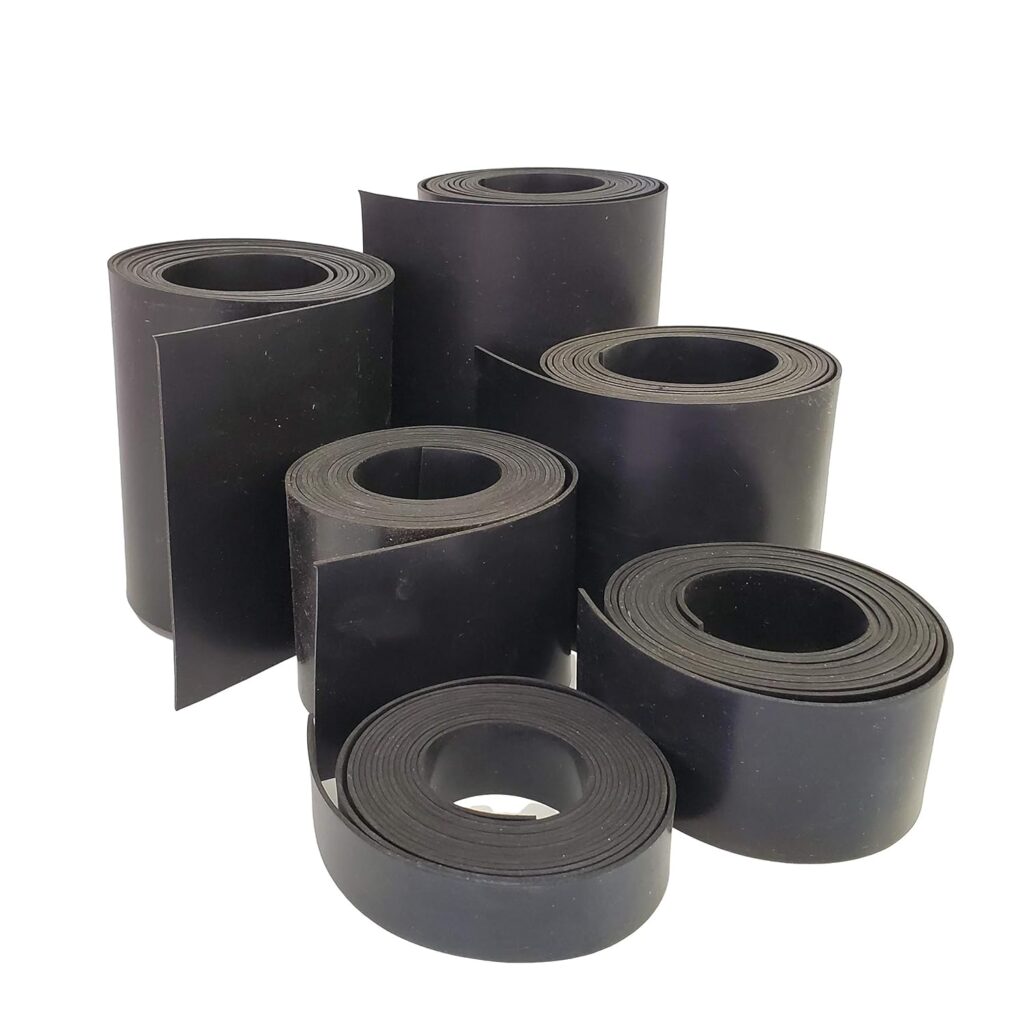
The manufacturing of nitrile gloves begins with the formulation of the nitrile rubber compound, which is then processed into a gel-like solution. This solution is fed into a production line, where it is coated onto ceramic hand molds. These molds pass through a series of tanks filled with calcium nitrate solution and other chemicals that help the nitrile to coagulate and form a glove-like shape. After the gloves have formed, they undergo a leaching process to remove residual chemicals and reduce protein content. Finally, the gloves are dried, tested for quality, and packed for distribution.
Benefits of Using Nitrile Gloves

Nitrile gloves offer several advantages over latex or vinyl gloves. Firstly, they are highly resistant to oils, chemicals, and acids, providing superior protection in various work environments. Nitrile gloves are also more puncture-resistant than latex gloves, offering better safety against sharp objects. For individuals with latex allergies, nitrile gloves are an excellent alternative as they are latex-free. These gloves also provide a higher level of tactile sensitivity, making them suitable for precise tasks. Additionally, nitrile gloves have a longer shelf life compared to latex gloves, making them a cost-effective option for many users.
Limitations and Drawbacks
Despite their numerous benefits, nitrile gloves do have some limitations. They generally cost more than latex or vinyl gloves, which can be a drawback for businesses or individuals requiring large quantities. While they are flexible, they may not provide the same level of comfort and fit as latex gloves, especially for extended wear. Nitrile gloves can also be less environmentally friendly due to their synthetic composition, as they are not biodegradable. In some cases, users may find that these gloves are less resistant to certain types of chemicals, necessitating careful selection based on the specific needs of the task at hand.
Applications and Industries
Medical and Healthcare Industry

In the medical and healthcare industry, nitrile gloves play a crucial role in maintaining hygiene and safety standards. They are essential for protecting healthcare workers and patients from the transmission of infectious agents. Nitrile gloves are preferred in medical settings due to their high resistance to punctures, which is vital when handling needles or other sharp instruments. Their chemical resistance also makes them suitable for handling certain medications and chemicals.
The gloves provide a barrier against bodily fluids, pathogens, and contaminants, significantly reducing the risk of cross-contamination. Furthermore, their latex-free nature makes them safe for use by professionals and patients who are allergic to latex. The durability and tactile sensitivity of nitrile gloves also enable healthcare workers to perform delicate tasks, such as surgeries or examinations, with precision and confidence.
Food Industry Usage

In the food industry, nitrile gloves are essential for ensuring food safety and hygiene. They are used by food handlers to prevent the spread of foodborne illnesses and to maintain cleanliness in food preparation areas. Nitrile gloves are preferred over other types of gloves due to their resistance to oils and certain chemicals, making them ideal for handling fatty foods or cleaning agents. They are also durable and resistant to tears and punctures, which is important in preventing contamination from glove pieces accidentally getting mixed into food.
The tactile sensitivity provided by nitrile gloves allows food handlers to perform tasks requiring precision, such as slicing or decorating food items. Furthermore, the powder-free nature of these gloves ensures that no residue is left on food, maintaining its quality and safety for consumption.
Industrial and Chemical Applications

Nitrile gloves are widely used in industrial settings and for handling chemicals due to their excellent chemical resistance. They provide protection against a variety of hazardous substances, including oils, solvents, acids, and caustics. This makes them ideal for use in chemical processing plants, laboratories, automotive industries, and in the manufacturing of paints and coatings.
The durability and puncture resistance of nitrile gloves are critical in these environments, where workers are often exposed to sharp tools and machinery. The gloves also offer a degree of tactile sensitivity, which is important for tasks that require precision handling. In addition, nitrile gloves can withstand higher temperatures compared to latex gloves, further enhancing their suitability for industrial applications. Their versatility and protective qualities make nitrile gloves a preferred choice for ensuring worker safety in challenging and hazardous working conditions.
Nitrile Gloves in Comparison to Other Gloves
Nitrile vs. Latex Gloves
Nitrile and latex gloves are both popular choices in various industries, but they have distinct differences. Nitrile gloves, made from synthetic rubber, are known for their superior chemical and puncture resistance. They are especially suited for handling hazardous materials and sharp objects. Nitrile gloves are also hypoallergenic, making them ideal for individuals with latex allergies.
In contrast, latex gloves, made from natural rubber, offer excellent flexibility and comfort, providing a more skin-like fit. They are highly preferred in the medical field for their high tactile sensitivity, crucial for surgeries and delicate procedures. However, latex gloves are less chemically resistant than nitrile and can cause allergic reactions in some individuals. Both types of gloves provide good protection, but the choice between them often depends on the specific requirements of the task and the user’s sensitivity to latex.
Nitrile vs. Vinyl Gloves
Comparing nitrile and vinyl gloves reveals key differences in their suitability for various tasks. Nitrile gloves, derived from synthetic rubber, offer excellent resistance to oils, chemicals, and punctures, making them suitable for medical, industrial, and automotive use. They provide better protection against pathogens and hazardous materials, along with greater durability and tear resistance. On the other hand, vinyl gloves, made from PVC, are less durable and offer limited protection against chemicals and sharp objects.
They are more suited for short-duration tasks that require less dexterity and protection, such as food service or light cleaning. Vinyl gloves are an economical option and are latex-free, which makes them a good choice for people with latex allergies. However, for tasks that demand higher protection and dexterity, nitrile gloves are generally the preferred option.
Our Selection :
PlastCare USA 100 Nitrile Exam Gloves:
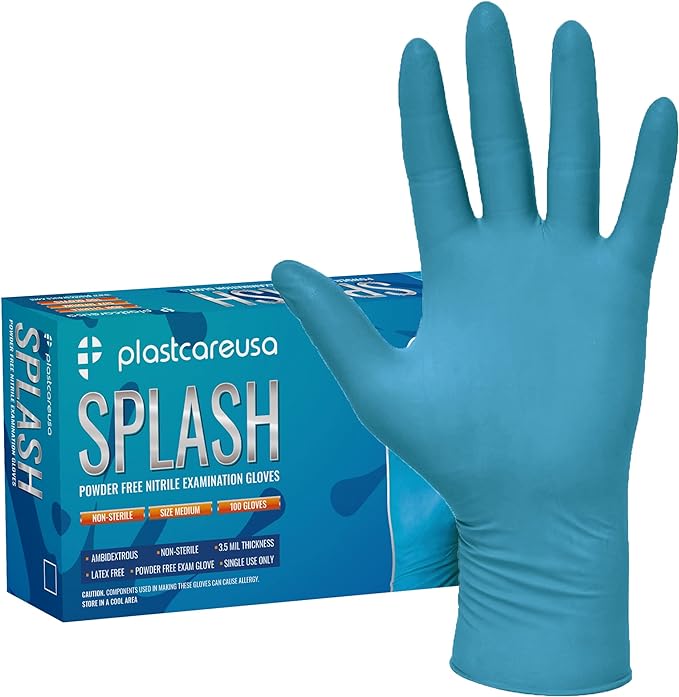
These are medium-sized, blue nitrile exam gloves. They are durable, puncture-resistant, and designed for easy donning and doffing. These gloves are powder and latex-free, making them suitable for individuals with allergies and sensitive skin. They are ambidextrous and come in a dispensing box for easy access. These gloves are primarily targeted towards dental professionals.
1st Choice Black Nitrile Gloves:
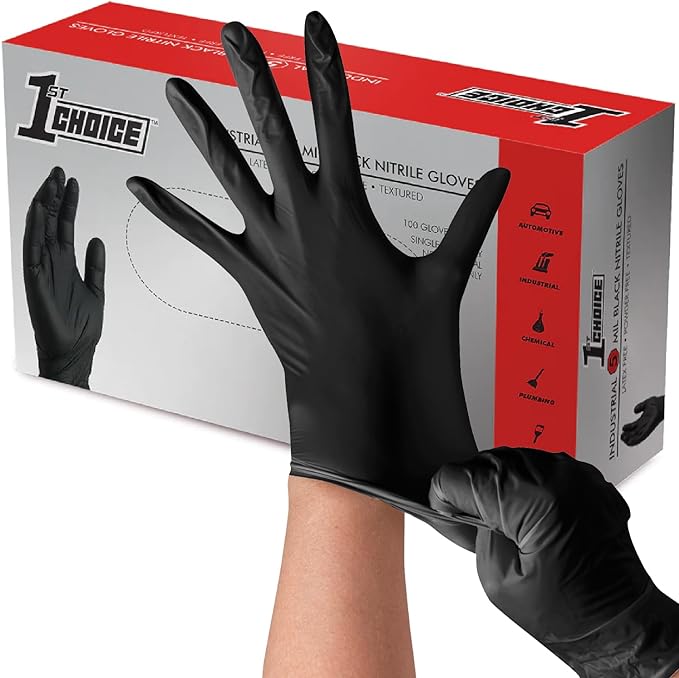
These are 5 mil thick black nitrile gloves, known for their durability and chemical resistance. They are latex-free and powder-free, making them suitable for people with latex allergies. These gloves are designed for a variety of uses, including handling grease, fuel, and other petroleum-based products. They come in various sizes and are sold in boxes of 100.
1st Choice 6 mil Mechanic Gloves:
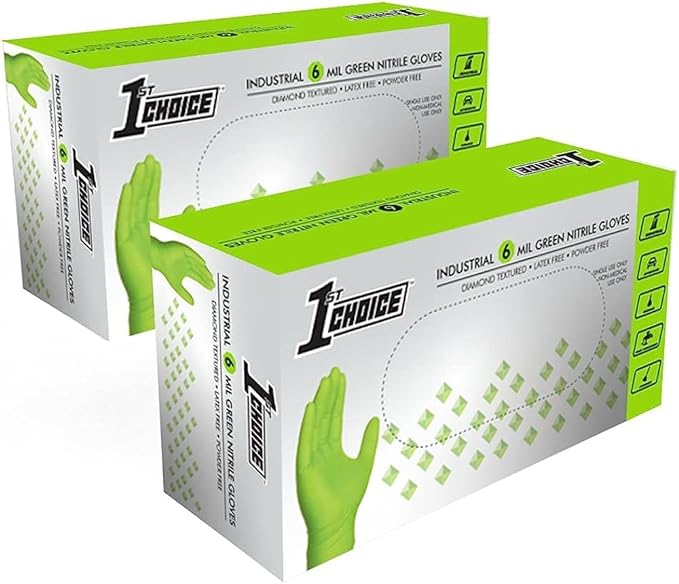
These are heavy-duty nitrile gloves with a 6 mil thickness and a raised diamond texture for an improved grip. They are suitable for larger hands and are ideal for mechanics, autoshop applications, and general cleaning. These gloves are also food-safe and chemical-resistant. They are available in green color and come in various sizes.
MaxiFlex ATG 34-874 Gloves:
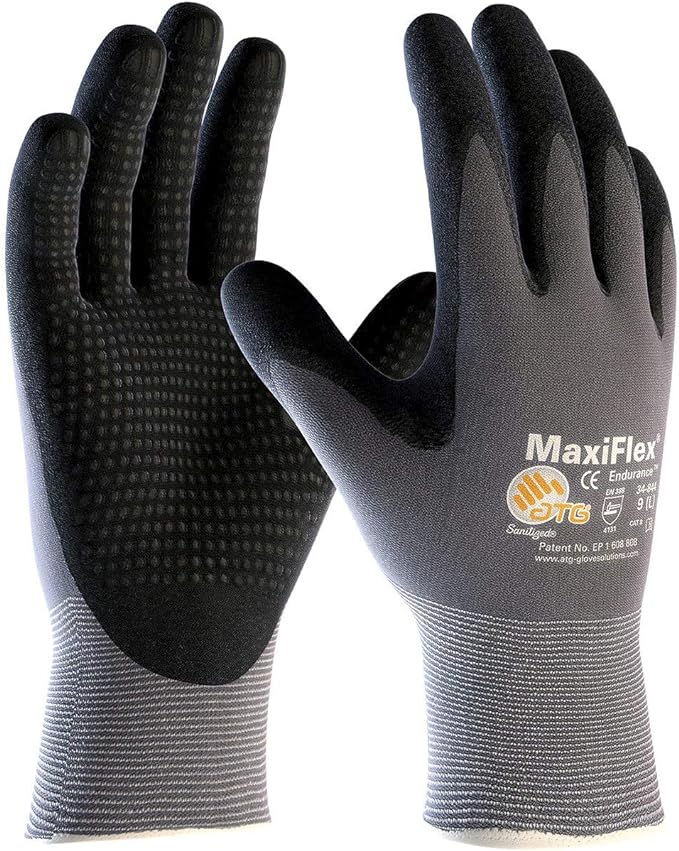
These are MaxiFlex gloves designed for excellent grip and comfort. They are made with nitrile micro-foam and are suitable for various applications. The gloves are large in size and come in a pack of 12. They are highly rated for their quality and durability.
FAQ :
What is a nitrile glove used for?
Nitrile gloves are used for protection against chemicals, oils, and pathogens in medical, industrial, and food handling environments. They provide excellent puncture resistance, making them ideal for tasks involving sharp objects. Hypoallergenic properties also make them suitable for individuals with latex allergies. Their dexterity and durability support various applications requiring precision and safety.
What is the difference between latex and nitrile gloves?
Latex gloves are made from natural rubber, offering high flexibility and tactile sensitivity, ideal for medical procedures. Nitrile gloves, made from synthetic rubber, provide superior chemical and puncture resistance, and are hypoallergenic. While latex gloves fit more snugly, nitrile gloves are more durable and better suited for handling hazardous materials, especially for those with latex allergies.
What should you not use nitrile gloves for?
Nitrile gloves should not be used for handling some strong organic solvents like acetone, as they can degrade the material. They’re also not suitable for high-heat applications or tasks requiring long-term exposure to harsh chemicals. Moreover, nitrile gloves are not ideal for tasks requiring extremely high tactile sensitivity, such as delicate surgeries.
Are nitrile gloves medical grade?
Nitrile gloves are available in both medical and industrial grades. Medical-grade nitrile gloves meet specific FDA standards for puncture resistance, chemical resistance, and biocompatibility, making them suitable for medical applications, including surgeries and patient examinations. Industrial-grade nitrile gloves, while still protective, are geared more towards handling chemicals, cleaning, and mechanical tasks.
In the end :
Nitrile gloves are a vital protective tool in various industries due to their robustness, chemical resistance, and hypoallergenic properties. They stand out from latex gloves by offering superior chemical and puncture resistance, making them ideal for handling hazardous materials and sharp objects, while being safe for individuals with latex allergies. Compared to vinyl gloves, nitrile gloves provide enhanced protection and durability, suitable for more demanding tasks. Their versatility across medical, food, and industrial sectors highlights their importance in maintaining safety and hygiene standards. The growing preference for nitrile gloves underscores their significance in ensuring effective protection in a wide range of professional and everyday environments.














